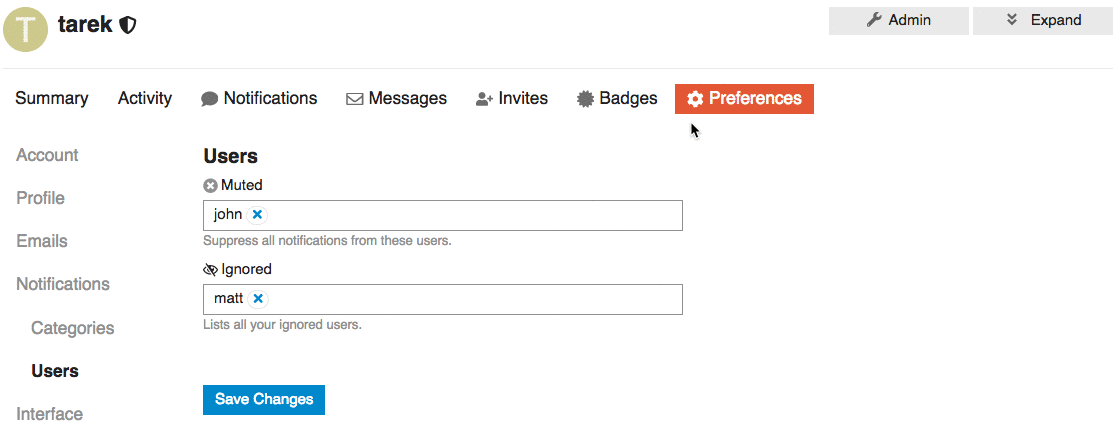Migrates email user options to a new data structure, where `email_always`, `email_direct` and `email_private_messages` are replace by
* `email_messages_level`, with options: `always`, `only_when_away` and `never` (defaults to `always`)
* `email_level`, with options: `always`, `only_when_away` and `never` (defaults to `only_when_away`)
- Notices are visible only by poster and trust level 2+ users.
- Notices are not generated for non-human or staged users.
- Notices are deleted when post is deleted.
* FEATURE: Add ignored user list to the User's preference page
## Why?
Part of: https://meta.discourse.org/t/ability-to-ignore-a-user/110254
We want to add list of Ignored users under or along with the muted users preferences section.
This way Users can find and update their list of ignored users.
## UI

## Open questions
Two of many options to represent a list of ignored users is that we can:
1. We can represent the ignored user list as a table with the ability to `un-ignore` but NOT to add new ignored users.
2. We can keep it functioning as the `muted user list` where you can `un-ignore` or `ignore` users.
* Adds warnings to the "Edit Category" dialog
* Doesn't hide the "Security" tab on the "Edit Category" dialog anymore. Instead, it shows an explanation why permissions can't be changed.
* Makes the category name translatable
* Hides the category name from the edit dialog (it can be customized by overriding the translation)
* Creates a translation override if the category has been renamed in the past
New `about.json` fields (all optional):
- `authors`: An arbitrary string describing the theme authors
- `theme_version`: An arbitrary string describing the theme version
- `minimum_discourse_version`: Theme will be auto-disabled for lower versions. Must be a valid version descriptor.
- `maximum_discourse_version`: Theme will be auto-disabled for lower versions. Must be a valid version descriptor.
A localized description for a theme can be provided in the language files under the `theme_metadata.description` key
The admin UI has been re-arranged to display this new information, and give more prominence to the remote theme options.
- Themes can supply translation files in a format like `/locales/{locale}.yml`. These files should be valid YAML, with a single top level key equal to the locale being defined. For now these can only be defined using the `discourse_theme` CLI, importing a `.tar.gz`, or from a GIT repository.
- Fallback is handled on a global level (if the locale is not defined in the theme), as well as on individual keys (if some keys are missing from the selected interface language).
- Administrators can override individual keys on a per-theme basis in the /admin/customize/themes user interface.
- Theme developers should access defined translations using the new theme prefix variables:
JavaScript: `I18n.t(themePrefix("my_translation_key"))`
Handlebars: `{{theme-i18n "my_translation_key"}}` or `{{i18n (theme-prefix "my_translation_key")}}`
- To design for backwards compatibility, theme developers can check for the presence of the `themePrefix` variable in JavaScript
- As part of this, the old `{{themeSetting.setting_name}}` syntax is deprecated in favour of `{{theme-setting "setting_name"}}`
This makes more sense than having the guardian take an accessor.
The logic belongs in the Serializer, where the JSON is calculated.
Also removed some of the DRYness in the spec. It's fewer lines
and made it easier to test the option on the serializer.
The wizard searches for:
* a topic that with the "is_welcome_topic" custom field
* a topic with the correct slug for the current default locale
* a topic with the correct slug for the English locale
* the oldest globally pinned topic
It gives up if it didn't find any of the above.